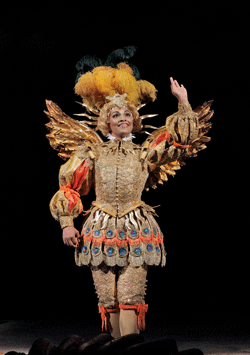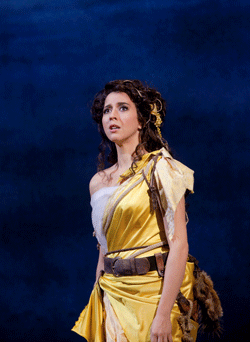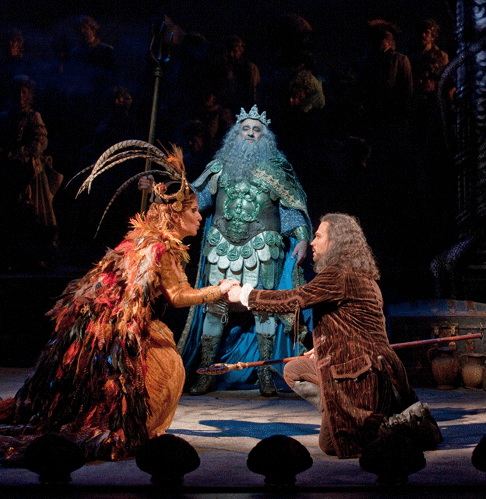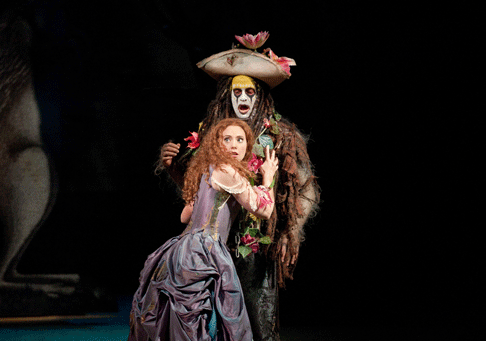25 Jan 2012
The Enchanted Island, Metropolitan Opera
This year is a big year for the Met. Of the seven new productions on the roster, two are the last two installments of a much-anticipated Robert Lepage Ring.

This year is a big year for the Met. Of the seven new productions on the roster, two are the last two installments of a much-anticipated Robert Lepage Ring.
Another, Anna Bolena, was more than simply a new production to mark opening night. It was also a new addition to the company’s repertoire. Still another, The Enchanted Island, was a world premiere. In this final instance, the composer who was lucky enough to land such a high profile engagement was none other than…George Frideric Handel?
 Danielle de Niese as Ariel
Danielle de Niese as Ariel
If this seems perplexing, don’t worry, it is. What’s even more confusing is, he is not the only composer to create this new work. The others, Antonio Vivaldi and Jean-Philippe Rameau, are just as old. The question then becomes: how can an opera be new if it utilizes music that is over two hundred years old? The answer is not as difficult as it would appear. The Enchanted Island, the brainchild of famed conductor and Baroque interpreter William Christie, with an English language libretto by Jeremy Sams, is meant to be a modern take on a Baroque genre known as pasticcio, in which multiple arias from one or more composers would be combined with occasional changes in text to create an entirely new plotline.
The idea of a modern pasticcio fits well into the scheme of the modern Baroque revival, which began in the latter half of the 20th century. However, despite the similarities between Baroque and Bel Canto opera, which was revived around World War II, Baroque works pose a greater challenge to modern audiences.
 Lisette Oropesa as Miranda
Lisette Oropesa as Miranda
This is because all aspects of Baroque opera performance practice are closely tied to the promotion of the absolutist regimes of the 17th century. In our modern era, when audiences are so far removed from these institutions, the challenge becomes making these works speak to people with the same immediacy they did centuries ago.
In this light, this opera, which combines elements of The Tempest and A Midsummer Night’s Dream into a comedy of errors and mistaken affections, was a rousing success. The work manages to flawlessly combine the diverse aspects of Baroque opera, such as the da capo aria, the use of ballet, innovative stage craft, as well as the distinction between recitative, arioso and aria seamlessly. Its principal roles, sung by such lauded Baroque interpreters as countertenor David Daniels (Prospero), soprano Danielle De Niese (Ariel), and mezzo soprano Joyce DiDonato (Sycorax), made an excellent case for the emotive power of Baroque music, especially its ornamentation, while at the same time updating the somewhat stilted figures of tragic nobility which populate Opera Seria.
In contrast to a work like Handel’s Giulio Cesare, in which the just nobles, Cesare and Cleopatra, are pitted against the wicked nobles, here symbolized by Ptolemeo, the nobility of The Enchanted Island was neither totally sympathetic nor totally antipathetic. Instead, each aria focused on the humanity of the emotions each character was feeling. In this light, Joyce DiDonato stole the show. Her opening aria, “Maybe Soon, Maybe Now,” showcased her ability to draw the emotive colors of Baroque ornamentation, which included growls.
 Joyce DiDonato as Sycorax, Placido Domingo as Neptune, and David Daniels as Prospero
Joyce DiDonato as Sycorax, Placido Domingo as Neptune, and David Daniels as Prospero
There were times when Danielle de Niese used her coloratura to explosive effect. In much the same way, David Daniels showed how improvised vocal technique could be used for emotional display. His legato showed vulnerability while his ornaments illustrated a fierce display of anger. Other standouts include Layla Claire as Helena and Elizabeth DeShong as Hermia; their voices blended excellently in their duet where they complain of their lovers’ rejection. Lisette Oropesa was a rather vulnerable Miranda. She gave an excellent turn in her arioso. Luca Pisaroni was comical yet sympathetic as Caliban. His role as Caliban allowed him to express the depth he is capable of. Countertenor Anthony Roth Costanzo was brilliant in the brief but crucial role of Ferdinand. Lastly, Placido Domingo, singing on his 71st birthday, was thrilling as Neptune. It is good to see that despite his age, his skill as a consummate performer has not diminished. However, his diction suffered at the expense of the fast runs of his music. In the end, that did not reduce the overall effect of his performance.
The production, directed by Phelim McDermott, combined elements of ancient Baroque productions with modern technology. The audience was able to see the full extent of the Metropolitan Opera’s resources, both in costuming as well as in technology. This allows modern audiences to experience the opera as someone would have back in Baroque times.
 Layla Claire as Helena and Luca Pisaroni as Caliban
Layla Claire as Helena and Luca Pisaroni as Caliban
I have only two criticisms. On occasion, the music didn’t fit the text. Naturally, this genre of opera is predicated on the da capo aria, with its contrasting A and B sections as symbolic of the Aristotelian view of rhetoric that was popular at the time. However, most often, in the music of Sycorax, as well as the early music of Ariel, the text seemed to depict the opposite of what the music was communicating. In the case of Sycorax, her text would be asking for pity when the music was bloodthirsty for revenge. Also, the opera is long, especially the first act. Prospero’s aria, which closes Act I, in which he expresses dismay at all the confusion he has caused, could just as easily have been moved to the beginning of Act II. This would have allowed Act I to end with the fanfare at the end of Neptune’s scene: a much stronger point for a finale.
When everything is taken into consideration, The Enchanted Island is indeed a new opera. Despite the fact that none of the music is original, it successfully recasts all the facets of the genre in a new light, which concentrates less on politics and more on artistic expression. If the multitude of young children at the performance was any indication, this opera met its goals with great success. As long as it can draw new audiences and demonstrate the staying power of its music, the Baroque revival is on track.
Greg Moomjy